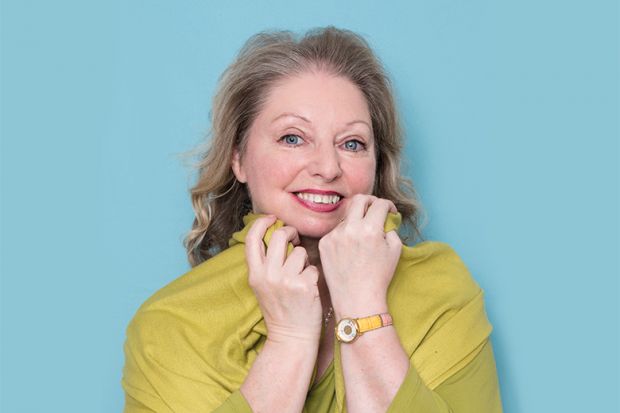Dame Hilary Mantel is the author of 11 novels, including A Place of Greater Safety (1992), Wolf Hall (2009) and Bring Up the Bodies (2012). The last two form part of a projected trilogy about Thomas Cromwell, and both won the Man Booker Prize, making her the first woman to receive the award twice. She recently received an honorary doctorate from the University of Roehampton at a ceremony marking the opening of the new university library.
Where and when were you born?
Hadfield, a mill village in north Derbyshire, in 1952. A lucky hour: far enough away from the war for the most meagre times to be over, but in good time to get a free education and opportunities my foremothers never imagined.
How has this shaped who you are?
I came from a couple of generations of mill-working families, Irish immigrants. Passing the 11-plus [selective examination] seemed vital, and I regarded myself as very lucky to do so. My cousin, 10 years older than myself, passed and went to a Catholic secondary school in Manchester, but left at 16 for secretarial college. Standing on her shoulders, I could see a bit further, and I was the first person in the family to go on to university.
What kind of undergraduate were you?
Studious, though my studies were eclectic. In my first year [studying law at the London School of Economics], I stuck to my subject, but when I transferred to [the University of] Sheffield [to join her husband], I spent a lot of time reading books on psychology and social history when I could have been in the law library.
Do you regret studying law rather than history or English?
Money was too tight for me to pursue a career in law; after graduation, I couldn’t have afforded to train. I didn’t really know this till I arrived at university…But I’ve never regretted it. It’s good and useful to know how the law works, and it introduces you to a different style of thinking. And the discipline has paid me back; many of my characters are lawyers.
Has anything divided your life into a “before” and an “after”?
My first acceptance letter from a publisher – from Chatto & Windus, for my novel Every Day Is Mother’s Day [published in 1985]. I have never quite got over the astonishment – part of me is still back there, struck dumb, mouth moving, holding out the letter and thinking, “Now everything has changed.”
Did you consult with academic historians when preparing to write Wolf Hall?
When I began, I didn’t know any Tudor historians. I didn’t imagine I should bother anyone – I just plunged in. But as my papers are at the Huntington Library in Pasadena, I met a Thomas Cromwell scholar by email: Mary Robertson, at that time chief archivist at the Huntington. We began a frequent exchange – which is still going. Mary lent me her invaluable doctoral thesis on Cromwell’s ministerial household, nudged me towards early sources and patiently received my speculations. She completely got the point of the novel. Now the trilogy is dedicated to her.
How have academic experts in the Tudors responded to your recent novels?
Almost all the scholars I now know have responded positively and often gleefully to the books, and I’ve had many fascinating dialogues with experts, on- and offstage. I think most historians understand that the trades are complementary, and they also see that I value the subject for its own sake and that I am familiar with divergent opinions and sources. Occasionally I’ve come across a less subtle scholar who doesn’t realise that you can’t thrash through every controversy on the page, and that a novel doesn’t have footnotes. I am working a bit counter to fashion – there has been a close focus in recent years on the iconography of the Tudors, viewing them almost anthropologically, but I am drawn to old-fashioned power politics. So while everyone is watching the gorgeous procession, my characters are cutting a deal in a back room.
What would be lost if the Tudors ceased to play such a role in the national imagination?
I think there is no way they’ll be displaced, unless we have another king with six wives and a hatchet…It’s one of those eras in which women really matter – not only Henry’s six wives, but the women around them and the three Tudor queens (if you include Jane Grey). Everything depends on their bodies as well as their minds.
What does it mean for you to receive an honorary doctorate?
Private study is central to my life, and I guess like most authors I have put in many more “unofficial” hours than those prescribed for me when I was actually a student; I’ve studied for a lifetime, and I intend to go on learning till I die. So to me, it seems honorary degrees recognise my solitary effort, and make me part of communities of learning.
Matthew Reisz
Appointments
John Leach has been named director of the Institute of Childhood and Education at Leeds Trinity University. He joins the institute, which is responsible for teacher training, primary and secondary education and childhood and education studies, from Sheffield Hallam University, where he was pro vice-chancellor for academic staffing and equalities and dean of the Faculty of Development and Society. In that role, he oversaw the establishment of the Sheffield Institute of Education, the Sheffield Institute for Policy Studies, and the Helena Kennedy Centre for International Justice. “Throughout my career, my main motivator has been to support education as a positive force for social improvement: this role enables me to do that in a very concrete way,” said Professor Leach, who previously spent more than 20 years at the University of Leeds.
Nipam Patel, a leading evolutionary biologist, has been appointed director of the Marine Biological Laboratory, an affiliate of the University of Chicago. Professor Patel, who currently holds the William V. Power endowed chair in biology at the University of California, Berkeley, will also be appointed a faculty member at Chicago.
Michael D. Dake has been appointed senior vice-president for health sciences at the University of Arizona. Professor Dake, who is currently Stanford University’s Thelma and Henry Doelger professor of cardiothoracic surgery, made medical history in 1992 with the implantation of the world’s first thoracic stent graft.
Diana Eccles will be the new dean of medicine at the University of Southampton. Professor Eccles, who was appointed chair of cancer genetics at Southampton in 2004, will take up her new role in September, succeeding Iain Cameron. She is the chief investigator for a large national study on breast cancer established in 2000, and she has also served as chair of the UK Cancer Genetics Group, secretary to the British Society for Genetic Medicine and president of the British Breast Group.
Register to continue
Why register?
- Registration is free and only takes a moment
- Once registered, you can read 3 articles a month
- Sign up for our newsletter
Subscribe
Or subscribe for unlimited access to:
- Unlimited access to news, views, insights & reviews
- Digital editions
- Digital access to THE’s university and college rankings analysis
Already registered or a current subscriber? Login










